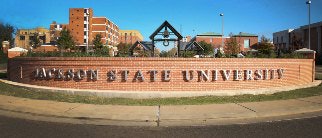 Jackson State University
Jackson State University
Last week, the Mississippi Institutions of Higher Learning (IHL) trustee board agreed to a 10-year, $1.518 million lease agreement on behalf of Jackson State University (JSU) for 8,600 square feet at an office complex on Galleria Parkway in Madison. The location provides JSU “greater potential to increase other race enrollment, thus allowing the university to come closer to attaining its 10 percent Ayers minority enrollment status,” according to an IHL report.
“Diversity is part of our DNA. We would hope that we would get a diverse population there [in Madison],” says Eric Stringfellow, the JSU director of communications.
Along with the other Mississippi HBCUs, JSU has a 10 percent minority status goal that’s based on the settlement of the Ayers v. Fordice lawsuit, which was filed in 1975 and decided 27 years later, in 2002.
The case plaintiff, the late Jake Ayers Sr., filed the lawsuit on behalf of his son, a JSU student, contending that the JSU education fell far short to that at Mississippi’s historically White universities. Part of the remedy for what federal courts found to be basically segregated universities has required the state’s historically Black schools to boost non-Black enrollment such that it reaches or exceeds a 10 percent other-race goal for three consecutive years.
JSU data provided by Stringfellow showed that JSU achieved 9.63 percent non-Black total enrollment in Fall 2012, up from 8.83 percent in Fall 2011 and 7.9 percent in Fall 2010.
“I think when you look at Madison, it’s probably one of the fastest growing areas in the state of Mississippi. … So for us, it’s an incredible opportunity to grow our enrollment, and we have some specific enrollment goals, and we think this campus could be key in helping us reach those goals,” says Stringfellow.
He says the Madison campus will concentrate on serving students who need the flexibility of evening and weekend classes, such as working adults with full- or part-time jobs. “The primary focus is definitely going to be on undergraduate education,” he notes.
Madison campus degree and non-degree programs are expected to focus on four areas, according to the IHL:
1) Business (Administration, Accounting and Entrepreneurship)
2) Education (Childcare and Family Education, Educational Leadership and
Higher Education)
3) Lifelong Learning (Interdisciplinary Studies, Human Resources Development,
Commercial Recreation and Resorts)
4) Public Service (Health Care and Social Work)
Recently, Dr. James Maddirala, associate vice president for academic affairs and global academic diversity, told Diverse that the university is not only seeking to meet its goal of three straight years over 10 percent non-Black enrollments, but to reach even higher levels of diversity. “Our goal is to reach 12 percent non-African-American enrollment by 2015,” Maddirala said.
In addition to planning the Madison satellite campus, Jackson State has concentrated on international initiatives, such as establishing satellite programs in India and China. Other initiatives have included recruitment from Mississippi’s American Indian, Eastern Indian and Hispanic populations.
In India, Jackson State plans to offer master’s and doctoral programs in public health and an executive Ph.D. in urban higher education. Maddirala said the programs also will provide study-abroad and faculty exchange opportunities.
“We’re going into Bangkok in 2015, and we have an offer in China, which will be a good opening for us,” Maddirala told Diverse.















